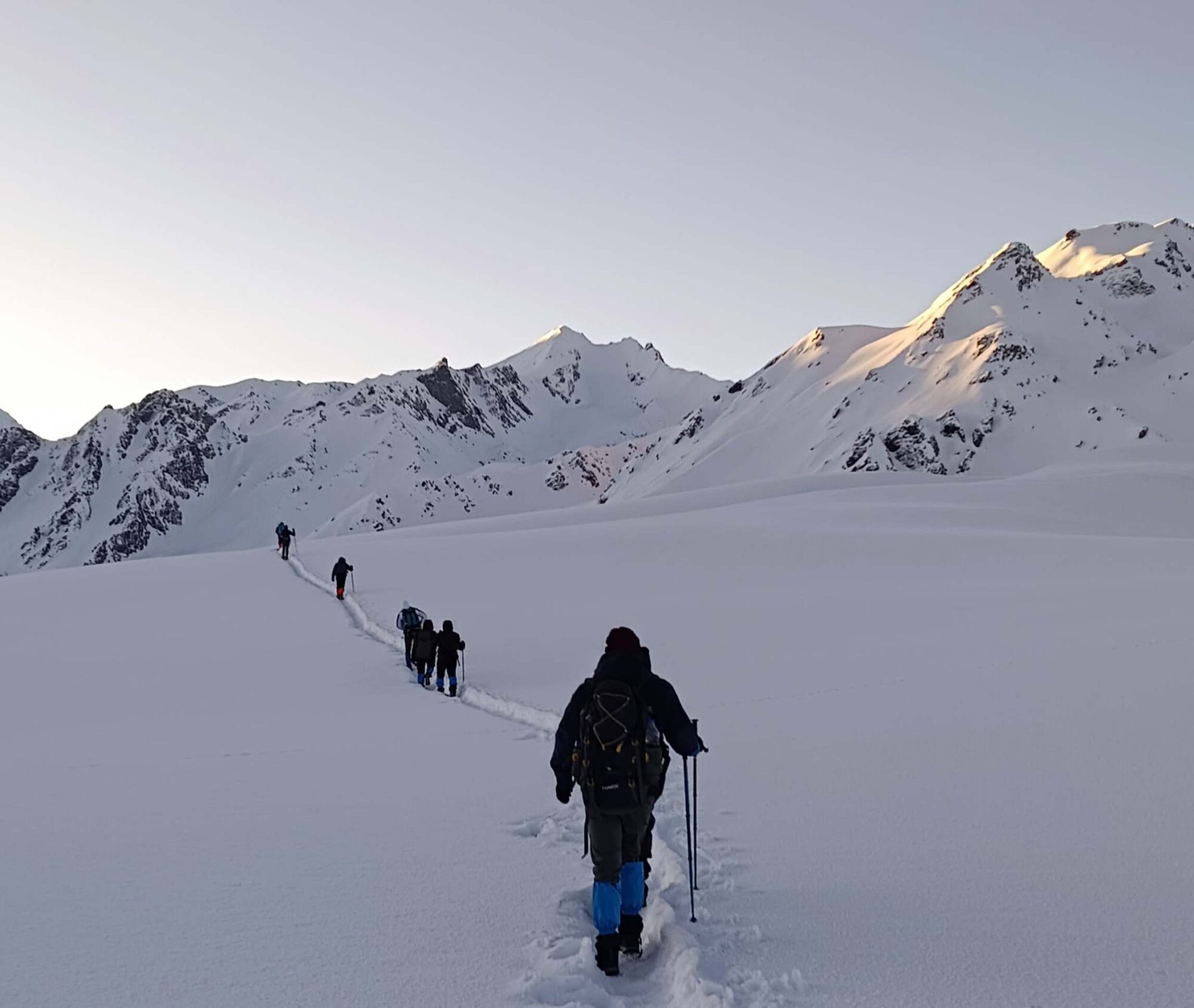An ideal beginner-friendly high-altitude trek in Parvati Valley, Himachal Pradesh, featuring gradual ascents, diverse terrain, and a snow-covered pass crossing. The trail passes through forests, meadows, and traditional villages, offering scenic beauty and cultural insight. Its close proximity to Kasol ensures easy access and quick evacuation, making it a safe and rewarding introduction to alpine trekking.
ITINERARY PLAN
Day 1 – Arrival in Kasol.
Arrive in Kasol by morning and check in to your accommodations. Take some time to rest and freshen up after the journey. Later, enjoy a relaxed walk through the Kasol market to soak in the local vibe and grab any last-minute essentials.
In the evening, gather for a detailed trek briefing followed by gear check and packing session. Wrap up the day with a wholesome dinner and get a good night’s rest as we prepare for the adventure ahead.
Day 2 – Kasol to Grahan Trek.
Distance: 9 km | Duration: 5–6 hours
After breakfast, gather for a trek briefing and collect your packed lunch. Set out from Kasol, following a scenic trail that winds through dense pine forests, cascading waterfalls, and mountain streams. As the path gradually steepens, challenge your stamina while soaking in the peaceful surroundings. Reach the beautiful Grahan village by late afternoon—a quiet Himalayan hamlet nestled amidst towering peaks.
Day 3 – Grahan to Min Thach Trek.
Distance: 7 km | Duration: 4–5 hours
Begin your day with a hearty breakfast in Grahan. The trail to Min Thach starts with a steady ascent through thick forest cover, gradually opening up to alpine meadows. Walk along a ridge line with stunning views of the surrounding mountains. As you gain altitude, feel the landscape shift from dense woodland to open pastures.
Reach Min Thach by early afternoon and settle into your campsite amidst panoramic views and fresh mountain air. Spend the evening unwinding, with a warm meal and a briefing for the next day’s trek.
Day 4 – Min Thach to Nagaru Trek.
Distance: 6 km | Duration: 4–5 hours
After breakfast at Min Thach, begin your ascent toward Nagaru. The trail climbs steadily and can be challenging, with sections of steep incline and snow patches depending on the season. As you gain altitude, the tree line fades and expansive views of the Parvati Valley emerge.
By early afternoon, arrive at Nagaru—a high-altitude campsite perched above the clouds, offering breathtaking vistas of snow-capped peaks. Rest, acclimatize, and prepare for the summit push ahead.
Day 5 – Nagaru to Biskeri Thach via Sar Pass.
Distance: 14 km | Duration: 7–8 hours
Start early from Nagaru for the most anticipated day of the trek. The trail ascends steeply over snow-covered terrain towards Sar Pass (approx. 13,800 ft). The climb is challenging but rewarding, offering panoramic views of towering Himalayan peaks.
After soaking in the vistas at the pass, begin a thrilling descent—often involving glissading down snow slopes—into lush meadows. The landscape transforms dramatically as you enter the vibrant alpine pastures of Biskeri Thach, where you’ll camp for the night surrounded by sweeping views and wildflowers.
Day 6 – Biskeri Thach to Pulga & drive to Kasol.
Distance: 8 km (trek) | Duration: 4–5 hours (trek) + 1.5 hours (drive)
Begin your descent from Biskeri Thach through dense forests, wooden bridges, and scenic meadows. The trail gradually leads you to the quaint village of Pulga, marking the end of your trek.
From Pulga, drive back to Kasol, where you can relax, unwind, and celebrate the completion of your Sar Pass adventure.
Day 7 – Departure from Kasol & Certification Ceremony.
After breakfast, gather for a certification ceremony to acknowledge your successful completion of the Sar Pass Trek. Participants will receive trek completion certificates as a token of achievement and resilience.
Post ceremony, check out and prepare for departure. Bid farewell to Kasol and the Parvati Valley, carrying home lasting memories, learnings, and the camaraderie of the mountains.

INCLUSIONS
- Transportation from Barshaini to Kasol.
- Alpine tents with sleeping bags & mattress.
- Toilet Tent.
- Meals from Day 1 dinner to Day 7 breakfast.
- Certified Trek leader & Local Guide.
- Support team, Basecamp manager & Kitchen Staff.
- Porters or Mules for Centralized load.
- WFR Team with Medical Kit & Oxygen Cylinder.
- All necessary permits.
EXCLUSIONS
- Mandatory Insurance.
- Any personal expense.
- Buffer day on additional cost of ₹ 1500 INR.
- Food during the transit.
- Mules or porters to carry personal load.
- Emergency evacuation or hospitalization charges.
- Any expense due to unforeseen circumstances.
- Mandatory Tips to Guide, Kitchen Team & Porters.
- Anything not mentioned in inclusions.
Trekking Essentials
Clothing
- 2–3 Quick-dry T-shirts
- 1 Full-sleeve T-shirt (for sun protection)
- 2 Pairs of trekking pants
- 1 Fleece or woolen sweater
- 1 Down/insulated jacket (for cold evenings)
- 1 Waterproof windcheater or poncho
- Thermal innerwear (top & bottom)
- 3–4 Pairs of socks (1 woolen)
- Warm cap + Sun cap
- Gloves (1 fleece/wool, 1 waterproof)
- Extra underwear
Footwear
- Sturdy trekking shoes (well broken-in)
- Lightweight floaters/sandals (for campsite use)
- Gaiters (optional, helpful in snow)
Backpack & Rain Protection
- 40–50L Backpack with rain cover
- Daypack (optional, for short walks or summit day)
- Waterproof backpack cover or dry sacks
Personal Essentials
- Reusable water bottles (2 x 1L) or hydration bladder
- Sunglasses with UV protection
- Sunscreen (SPF 40+) & lip balm (SPF)
- Toiletries (toothbrush, toothpaste, biodegradable soap, toilet paper, hand sanitizer)
- Quick-dry towel
- Personal medication (with basic first aid)
Accessories
- Torch/headlamp with extra batteries
- Trekking poles (recommended)
- Power bank
- Notebook + pen (optional, for journaling)
- Trail snacks (dry fruits, energy bars, ORS)
Documents
- Government-issued ID (Aadhaar, Passport, etc.)
- Medical certificate
- Adventure Insurance
Rules & Regulations
- Fitness & Health – Climbers must be physically fit and free from serious medical conditions.
- Permit & ID – Carry valid ID Proof.
- Eco Friendly Climbing – No littering, no plastic waste, follow leave no trace principles.
- Alcohol & Smoking – Strictly prohibited during the trek for safety reasons.
- Follow leader’s instructions – Adhere to designated trails and safety reasons.
- Respect Nature & wildlife – Avoid disturbing flora & fauna, no loud music.
- Emergency protocols – Inform the team of any health issues and follow evacuation procedures if needed.
Frequently Asked Questions
What is the difficulty level of the Sar Pass Trek?
The Sar Pass Trek is considered moderate, making it suitable for beginners with basic fitness. It includes gradual ascents, forest trails, and a snow-covered pass crossing.
What is the maximum altitude reached during the trek?
The highest point is Sar Pass at approximately 13,800 ft (4,200 meters).
How long is the trek?
The total trekking distance is around 48–50 km, completed over 6 trekking days.
When is the best time to do the Sar Pass Trek?
The best time is May to early July, when the trail is accessible and snow at the pass is ideal for a safe crossing.
Is prior trekking experience necessary?
No prior experience is required, but a basic level of fitness is recommended as the trek involves daily walks of 5–8 hours.
What kind of accommodation is provided?
Participants stay in tents at campsites along the trail, with basic sleeping arrangements and meals provided.
What should I pack for the trek?
Essentials include a backpack, trekking shoes, warm layers, waterproof jacket, gloves, cap, sunglasses, water bottles, and personal toiletries. A detailed gear list is usually shared before departure.
Are meals provided during the trek?
Yes, all vegetarian meals (breakfast, lunch, dinner, and snacks) are provided from Day 1 evening till Day 6 evening.
Is the trek safe?
Yes, it’s relatively safe, especially with experienced trek leaders and support staff. The proximity to Kasol allows for quick evacuation if necessary.
Will there be mobile network on the trail?
Mobile connectivity is limited. Network is usually available in Kasol and Grahan, but beyond that, expect to be off-grid.
What is the group size?
Groups typically consist of 6 to 8 participants, led by certified trek leaders and supported by a local team
Do we receive a certificate after completing the trek?
Yes, all participants receive a trek completion certificate at the end of the program.
🧭 Ready to Join the Sar Pass Trek?
Here’s how you can book your slot:
📌 Step 1: Reach out to us for any queries or to check available dates.
📌 Step 2: Confirm your participation by filling out the registration form.
📌 Step 3: Make the advance payment to secure your spot.
📌 Step 4: Receive a confirmation mail along with a detailed gear list and preparation guide.

